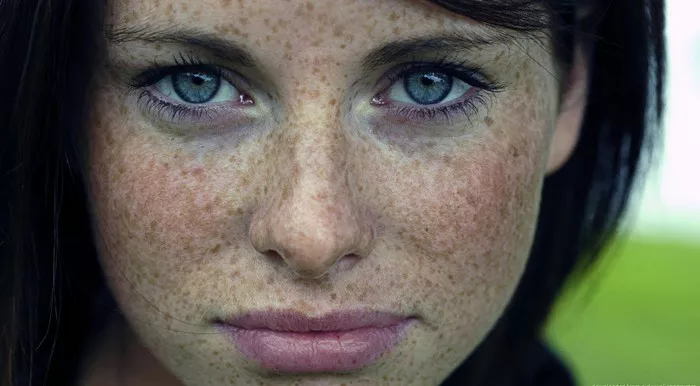Freckles are small, flat, brown spots that appear on the skin. They are caused by an increase in the production of melanin, which is the pigment that gives skin its color. Freckles are most commonly found on the face, arms, and shoulders, and can vary in size and color.
Freckles develop as a result of exposure to sunlight. Sunlight triggers the production of melanin in the skin, which can cause freckles to appear. Freckles can also be genetic, meaning that they can be passed down from parents to their children.
Cultural and Societal Perception of Freckles
The perception of freckles has varied throughout history and across cultures. In some cultures, freckles are considered a sign of beauty and youthfulness. In others, they are seen as a flaw or imperfection.
In Western cultures, freckles have traditionally been associated with redheads and have been viewed as a unique and attractive feature. However, freckles have not always been universally accepted as attractive. In the past, freckles were sometimes associated with negative stereotypes, such as being unclean or lazy.
Potential Benefits and Drawbacks of Having Freckles
There are both potential benefits and drawbacks to having freckles. Some of the potential benefits of having freckles include:
Unique appearance: Freckles can give a person a unique and distinctive appearance that sets them apart from others.
Youthful appearance: Freckles are often associated with youthfulness and can make a person appear younger than they actually are.
Protection from sun damage: Freckles can be a sign that a person’s skin is more sensitive to sunlight. This sensitivity can help protect the skin from sun damage and skin cancer.
However, there are also potential drawbacks to having freckles. Some of the potential drawbacks include:
Increased risk of sun damage: Freckles can be a sign that a person’s skin is more sensitive to sunlight. This sensitivity can increase the risk of sun damage and skin cancer.
Negative stereotypes: As mentioned earlier, freckles have not always been universally accepted as attractive. Some people may view freckles as a flaw or imperfection.
Embracing and Celebrating Freckles
For those who have freckles and want to embrace and celebrate them, there are several ways to do so. Some of these ways include:
Using makeup: Makeup can be used to enhance freckles and make them more prominent.
Avoiding sun damage: Protecting the skin from sun damage can help prevent freckles from becoming more pronounced and protect against skin cancer.
Embracing uniqueness: Recognizing and embracing the uniqueness of freckles can help individuals feel more confident and proud of their appearance.
Concealing Freckles
For those who wish to conceal their freckles, there are also several ways to do so. Some of these ways include:
Using makeup: Makeup can be used to cover up freckles and create a more even skin tone.
Laser treatment: Laser treatment can be used to reduce the appearance of freckles.
Chemical peels: Chemical peels can be used to lighten the skin and reduce the appearance of freckles.
Conclusion
In conclusion, the perception of freckles is varied and has changed throughout history and across cultures. While some people view freckles as attractive and unique, others may view them as a flaw or imperfection. There are both potential benefits and drawbacks to having freckles, and individuals can choose to embrace and celebrate them or conceal them if desired. Regardless of one’s personal preference, it is important to protect the skin from sun damage and maintain overall skin health.
FAQs
1. Is it pretty to have freckles?
Beauty is subjective, and opinions on freckles vary from person to person. Some individuals find freckles attractive and charming, considering them unique features that add character to one’s appearance. Others may not prefer freckles or may have neutral feelings about them. Ultimately, whether freckles are considered pretty or not depends on individual preferences and cultural perceptions of beauty.
2. Is it better to have freckles or not?
Whether it’s “better” to have freckles or not is subjective and based on personal preferences. Freckles are a natural characteristic of the skin, and there is no inherent advantage or disadvantage to having them. Some people embrace their freckles as part of their identity, while others may prefer to minimize their appearance through makeup or other methods. Ultimately, what matters most is how comfortable and confident an individual feels in their own skin, regardless of whether they have freckles or not.
3. Is it rare to have freckles?
The prevalence of freckles varies among individuals and populations. Freckles are more common in individuals with fair skin and red or light hair, as they tend to have less melanin, which provides natural sun protection. While freckles may be less common in certain ethnic groups or darker skin tones, they can still occur. Overall, the frequency of freckles is influenced by genetics, sun exposure, and other environmental factors.
4. What do girls think of guys with freckles?
Opinions on guys with freckles vary among individuals, just like any other physical feature. Some girls may find freckles attractive and endearing, considering them unique and appealing features. Others may not have a strong preference or may even find freckles unnoticeable. Ultimately, whether freckles are viewed positively or not depends on individual tastes and preferences. It’s essential for individuals to embrace their natural features and feel confident in their appearance, regardless of whether they have freckles or not.


